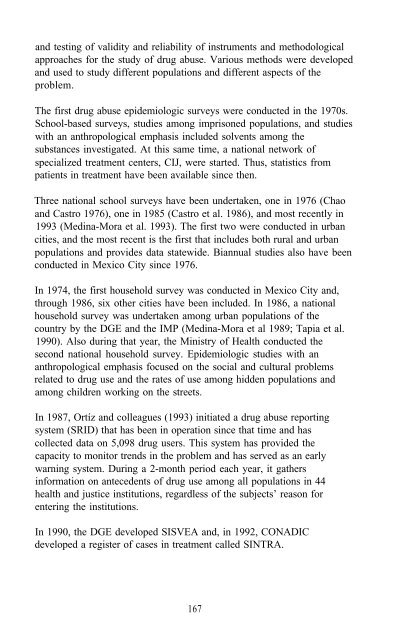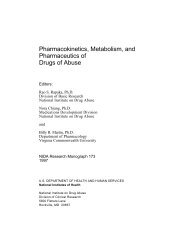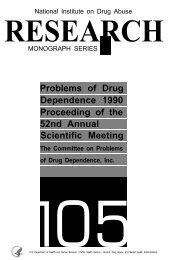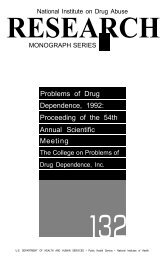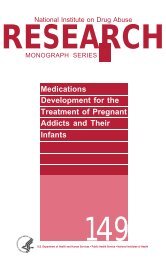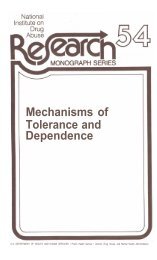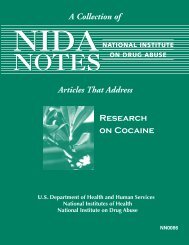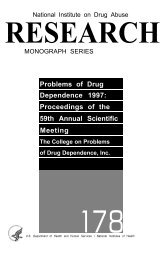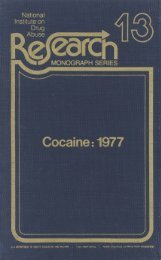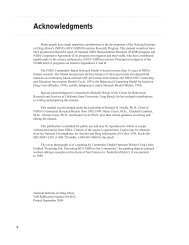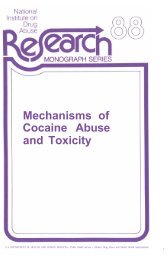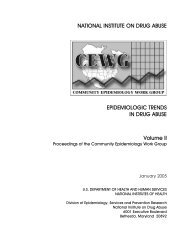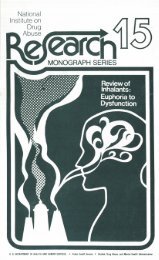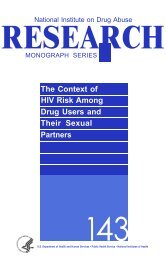Epidemiology of Inhalant Abuse - Archives - National Institute on ...
Epidemiology of Inhalant Abuse - Archives - National Institute on ...
Epidemiology of Inhalant Abuse - Archives - National Institute on ...
You also want an ePaper? Increase the reach of your titles
YUMPU automatically turns print PDFs into web optimized ePapers that Google loves.
and testing <str<strong>on</strong>g>of</str<strong>on</strong>g> validity and reliability <str<strong>on</strong>g>of</str<strong>on</strong>g> instruments and methodological<br />
approaches for the study <str<strong>on</strong>g>of</str<strong>on</strong>g> drug abuse. Various methods were developed<br />
and used to study different populati<strong>on</strong>s and different aspects <str<strong>on</strong>g>of</str<strong>on</strong>g> the<br />
problem.<br />
The first drug abuse epidemiologic surveys were c<strong>on</strong>ducted in the 1970s.<br />
School-based surveys, studies am<strong>on</strong>g impris<strong>on</strong>ed populati<strong>on</strong>s, and studies<br />
with an anthropological emphasis included solvents am<strong>on</strong>g the<br />
substances investigated. At this same time, a nati<strong>on</strong>al network <str<strong>on</strong>g>of</str<strong>on</strong>g><br />
specialized treatment centers, CIJ, were started. Thus, statistics from<br />
patients in treatment have been available since then.<br />
Three nati<strong>on</strong>al school surveys have been undertaken, <strong>on</strong>e in 1976 (Chao<br />
and Castro 1976), <strong>on</strong>e in 1985 (Castro et al. 1986), and most recently in<br />
1993 (Medina-Mora et al. 1993). The first two were c<strong>on</strong>ducted in urban<br />
cities, and the most recent is the first that includes both rural and urban<br />
populati<strong>on</strong>s and provides data statewide. Biannual studies also have been<br />
c<strong>on</strong>ducted in Mexico City since 1976.<br />
In 1974, the first household survey was c<strong>on</strong>ducted in Mexico City and,<br />
through 1986, six other cities have been included. In 1986, a nati<strong>on</strong>al<br />
household survey was undertaken am<strong>on</strong>g urban populati<strong>on</strong>s <str<strong>on</strong>g>of</str<strong>on</strong>g> the<br />
country by the DGE and the IMP (Medina-Mora et al 1989; Tapia et al.<br />
1990). Also during that year, the Ministry <str<strong>on</strong>g>of</str<strong>on</strong>g> Health c<strong>on</strong>ducted the<br />
sec<strong>on</strong>d nati<strong>on</strong>al household survey. Epidemiologic studies with an<br />
anthropological emphasis focused <strong>on</strong> the social and cultural problems<br />
related to drug use and the rates <str<strong>on</strong>g>of</str<strong>on</strong>g> use am<strong>on</strong>g hidden populati<strong>on</strong>s and<br />
am<strong>on</strong>g children working <strong>on</strong> the streets.<br />
In 1987, Ortíz and colleagues (1993) initiated a drug abuse reporting<br />
system (SRID) that has been in operati<strong>on</strong> since that time and has<br />
collected data <strong>on</strong> 5,098 drug users. This system has provided the<br />
capacity to m<strong>on</strong>itor trends in the problem and has served as an early<br />
warning system. During a 2-m<strong>on</strong>th period each year, it gathers<br />
informati<strong>on</strong> <strong>on</strong> antecedents <str<strong>on</strong>g>of</str<strong>on</strong>g> drug use am<strong>on</strong>g all populati<strong>on</strong>s in 44<br />
health and justice instituti<strong>on</strong>s, regardless <str<strong>on</strong>g>of</str<strong>on</strong>g> the subjects’ reas<strong>on</strong> for<br />
entering the instituti<strong>on</strong>s.<br />
In 1990, the DGE developed SISVEA and, in 1992, CONADIC<br />
developed a register <str<strong>on</strong>g>of</str<strong>on</strong>g> cases in treatment called SINTRA.<br />
167


